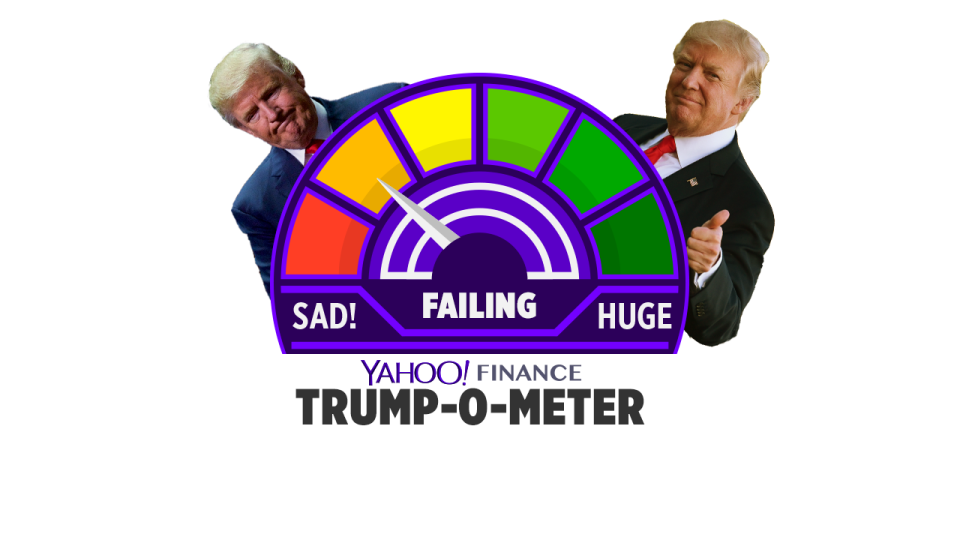This week in Trumponomics: The Trump trade war starts to hurt
Wall Street is now officially worried about the Trump trade war.
Investors have been vacillating over whether President Trump’s protectionist crusade is a passing fad or a serious threat. Until mid-June, markets seem to believe a passel of tariffs on steel and aluminum imports, plus about one-tenth of all Chinese imports, wouldn’t cause serious damage. But that narrative has now changed.
Trump isn’t satisfied with the results of his tariffs so far, so he’s threatening to slap new tariffs on $400 billion worth of Chinese imports, in addition to the $50 billion he’s already singled out. Chinese imports to the United States total around $500 billion, so Trump is essentially saying nearly everything Americans buy from China could become more expensive. Beyond that, Trump threatened a 20% tariff on car imports from Europe, and he’s considering tariffs on all imported cars, which total around 8 million per year.
Trump’s protectionism is beginning to sour markets. Auto stocks fell this week on concern that tariffs will dent profitability. Big exporters such as Boeing and Caterpillar are getting torched, which dragged the Dow Jones index to 8 days of consecutive losses. The broader market is doing slightly better, but gloom is mounting about Trump spoiling an otherwise strong economy.
That’s why this week’s Trump-o-meter reads FAILING, our second-lowest grade.

Here’s a roundup of Wall Street sentiment on the Trump trade war from the last few days:
“A trade war coupled with a confidence shock could push the US to the brink of recession.” – Bank of America Merrill Lynch
“The bumpy road ahead suggests uncertainty will remain high and will continue to have an adverse impact on sentiment and activity.” – Citibank
“Equities continue to be stuck in their ‘fat and flat’ range after renewed concerns on trade conflict drove a global risk-off.” – Goldman Sachs
Trump is essentially playing chicken with financial markets, hoping his madman approach to economic pain will force trade partners to blink first. But they’re not blinking. Instead of making concessions, China, Canada and the European Union have all raised tariffs on imports from the United States in the same proportion as Trump has raised tariffs on imports from those nations.
So now everybody is wondering, where will it end? Will China or Canada or Europe back down and give Trump the trade victory he desperately wants? Or will nobody back down, forcing Trump to impose the increasingly drastic tariffs he’s threatening, to prove how tough he is?
We didn’t give Trump our worst grade—SAD!—because there was one potential opening on trade this week. Germany automakers—including Volkswagen, Mercedes and BMW—recently backed a plan to eliminate all automotive tariffs between the United States and Europe, which are currently 10% on US-made cars going to Europe and 2.5% on vehicles going the other way. That would seemingly meet Trump’s call for “fair and reciprocal” trade.
There’s one caveat: The Europeans also want Trump to repeal a 25% tariff on all imported pickups, which has been in place since 1963. Fat chance Trump will do that, since the pickup tariff essentially keeps cheap imported trucks out of the US market, providing a strong incentive to build trucks in the United States. Right. The United States unfairly blocks foreign competition the same way Trump complains about other countries doing.
For now, Trump’s tariffs apply to just 4.5% of all imports, equivalent to a scant 0.5% of GDP. The economy can handle that. But if Trump wants to expand his tariffs 5- or 10-fold, there’s trouble ahead. Tariffs raise prices, push up inflation, disrupt global supply chains and impair business and consumer confidence. Gathering gloom in the outlook for stocks is a sign that’s starting to happen. And Trump’s protectionism might still be in early innings.
Confidential tip line: rickjnewman@yahoo.com. Click here to get Rick’s stories by email.
Rick Newman is the author of four books, including Rebounders: How Winners Pivot from Setback to Success. Follow him on Twitter: @rickjnewman
Follow Yahoo Finance on Facebook, Twitter, Instagram, and LinkedIn

 Yahoo Finance
Yahoo Finance 
